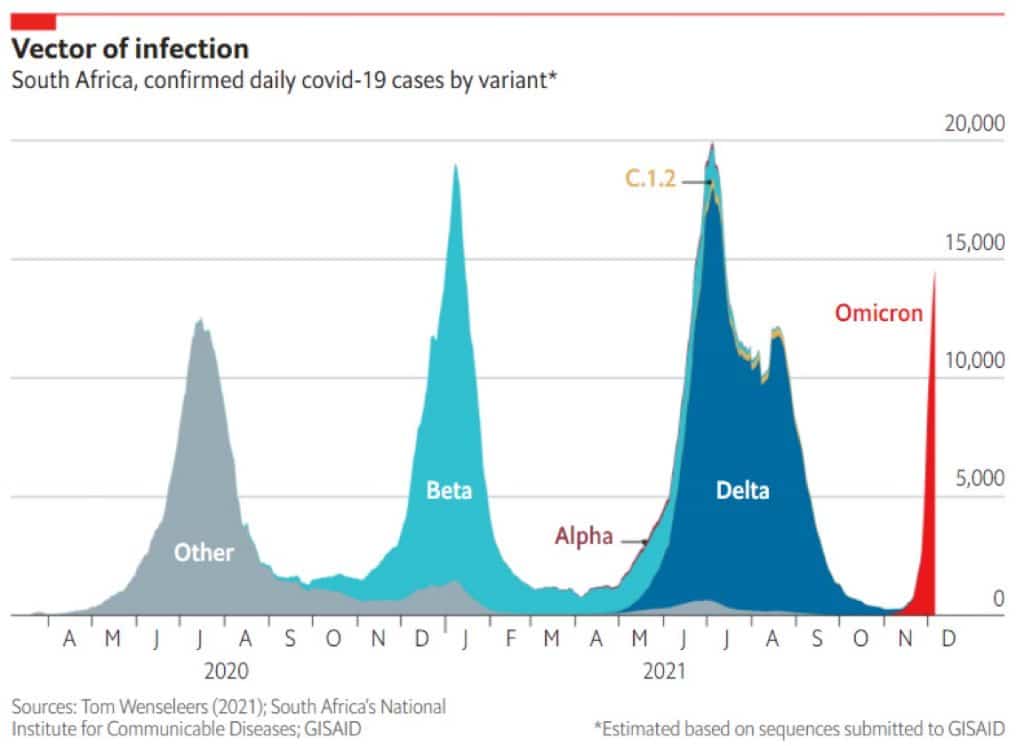

The World Health Organization (WHO) designated a new variant of Covid 19 as a variant of concern and named it Omicron on November 26. As of December 8, 57 countries announced Omicron within their territories. Yet Turkey’s Fahrettin Koca stated via Twitter on December 3 that there is no new variant in Turkey yet.
I would only say: if you don’t look, you won’t see it.
Turkey prides itself on being in the middle of global transportation and exchange networks. Indeed, many passengers pass through Istanbul airport, especially from developing countries to the rich “west” and “north”. Two countries announced that they detected Omicron in two passengers passing through Turkey last week. But, curiously, at the airport they passed by, and probably had spent hours, they left no trace!
The Ministry of Health of Turkey has been outsourcing genetic sequencing, which is used to detect new variants of the virus, to a private company. As usual, they do not share the results with the public. Dozens of universities in Turkey have the capacity to carry out sequencing , but they are not granted the permission. Why?
As it happens, Botswana detected and announced a totally new variant, but Turkey reports none. “There is not a variant” until the variant has taken over the country.
FAQs: Is it more contagious? Will our vaccines work?
Omicron contains a large number of mutations, and some of these mutations raise concerns that they may help the virus to be both more transmissible and escape the immune system (whether acquired from previous infection or vaccine-induced immunity).
Preliminary observations seem to contradict each other. We need more data to assess the real life efficacy of vaccines. Firstly, some recently published research results support the concerns. For example, in the Republic of South Africa, less than one percent of Covid cases were Omicron in October; this rate is now ninety percent. However, South Africa had the Delta outbreak under control and reduced the cases; maybe that’s why only Omicron is spreading right now. In the coming days, we will see if Omicron will dominate in countries where Delta is widespread, and we will be able to evaluate its transmissibility better. Secondly, three separate laboratory studies published on December 7 and 8 suggest that Omicron may evade vaccines. However, these studies can only measure one feature of our complex and multi-layered immune system. In real life, the situation may be different. Based on a limited number of observations, data from South Africa indicate that vaccinated people are less affected. We’ll see more real-life data in the coming weeks, and we’ll be able to be more precise then. However, most immunologists think that vaccines will still work, even if their effectiveness may be reduced to some degree. But for now, preliminary data suggest that the situation is not good.
For those interested in learning more The Turkish Society of Clinical Microbiology and Infection summarizes the scientific developments on this subject clearly and understandably, with their limitations.
“The virus has softened and became milder“? Really?
A member of the official Turkey’s Scientific Committee working under Ministry of Health said that the Omicron variant caused “the virus to get softened and become milder”. However, it is unclear what is the scientific evidence leading to this comment. At this time, we only have conclusions drawn from observations of a limited number of hospitalized patients, mainly from an area in the Republic of South Africa. This pandemic has taught that such announcements or rushed optimisms based on a limited number of patients, or a single region and country bring more harm than good.
We need to take precautions, using tools we know to work. At the timebeing, both the members of the Scientific Committee and anyone who has a say on the subject should avoid statements that might lead to false perceptions. Comments like “we don’t have omicron in our country” or “virus has softened” will only result in our citizens, already left alone to cope with the virus to further reduce their guard, to “soften” the measures we need to set up against the new variant.
WHO warns governments: Act in days, not weeks
Omicron, which has a high infection rate, poses a significant threat to European countries, including Turkey, which are already incapable of combating Delta and retreated indoors due to winter. The WHO advices governments, not to wait until hospitals are full, but to “act now”. To stop meaningless and discriminatory measures, such as closing flights to South Africa, for a variant which has been found to exist at least in 57 countries, and to take public health measures known to work: better surveillance, more testing, more sequencing, and sharing the samples with WHO., Countries, including Turkey should focus on the unvaccinated, especially those missed out among high-risk groups.
WHO had spent February 2020 making similar calls. At the time most governments ignored it. A few weeks later, when the intensive care units were overflowing, those who preferred to ignore the calls, accused WHO of being late, and some took things even further to accuse WHO Director of collaborating with China to hide the facts about new virus. I hope we will not see a similar situation.
We don’t know, how the authorities in Turkey will act and how much they will comply with WHO’s advice. We as citizens have to do what we can: wear a mask, keep your distance, pay attention to ventilation of closed spaces, , avoid crowds, and go and get your vaccine. Even if the efficacy of vaccines diminishes somewhat, they are still expected to reduce the severity of the disease. Get vaccinated, complete the missing doses. Encourage those around you to get vaccinated.


